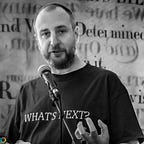What we have learned about co-ops
We’ve been running a discovery on becoming a co-op. We have learned, in the way of these things, a number of interesting and potentially contradictory items.
There is a need for a mutual support co-op
We have spoken to many freelancers who, while they value the independence and flexibility of their freelance life, would value the opportunity of a mutual support co-op.
A mutual support co-op could help freelancers who typically feel alone. It could help people learn from each other and share their experience and skills. It could build a “Our way” ethos and make it easier for freelancers to co-operate together on larger projects. They would have greater trust and understanding of each other compared to freelancers who come together only when there is something to bid for.
There is a need for a consortium co-op
We have also spoken to freelancers who would value being part of a multi-skilled team within which they can work on larger scale projects whithout having to become shackled into an organisation over which they have limited control.
Within a consortium co-op freelancers (and micro businesses) could pool resources to invest in things that are best provided jointly (like business development). The consortium could bid for work confident that its members are committed to providing their best work within the co-op.
These are not the same thing
While there would, no doubt, be social benefits from working within a consortium co-op: the focus there is on pooling resources and generating work. Hopefully valuable, rewarding and satisfying work but work nonetheless.
The mutual support co-op might well lead to exciting and interesting collaborations but these would be between small groups of members not directly mediated by the co-op.
What do we do now?
We set off on this journey with an idea in our mind that was closer to the consortium co-op idea. There are certainly some people in our world who are thinking the same way. There is a (reasonably) straightforward business model to be drawn up to sustain and grow a consortium.
We have found a strong need for the mutual support co-op idea. When people approached us on the strength of our blogposts about co-ops it was this need that they were largely seeking to address. Speaking personally I’m very motivated by the mutual support co-op idea but the business model at play here is much more about the social rather than the monetary value.
These are not fundamentally mutually exclusive approaches but they are a very different emphasis. We have found ourselves at a junction on a journey and we need to take one fork or the other.
And, in fact, we’ve found that choosing one way to the other is proving hard.
What can you do?
We’ve been running some small scale experiments with a mutual support community. This is centred around a Slack Workspace. If you share our mission and values and think you could contribute to this community. Please get in touch.
We’ve also been talking to people and organisations who might be interested in joining a consortium co-op. If you think that you’d like to work with others on solving problems for the public sector get in touch about that.
And if you have experience or suggestions that could help us along our journey (whichever fork in the road we end up taking)… get in touch about that too.
Thanks for reading.
Please clap so I know you were here…
I’m Ben from The Satori Lab. We work to support public servants so they have the right tools, skills and culture to design excellent public services.
Get in touch if that’s something you can help with.
You may also know me from Twitter where I am @likeaword.
